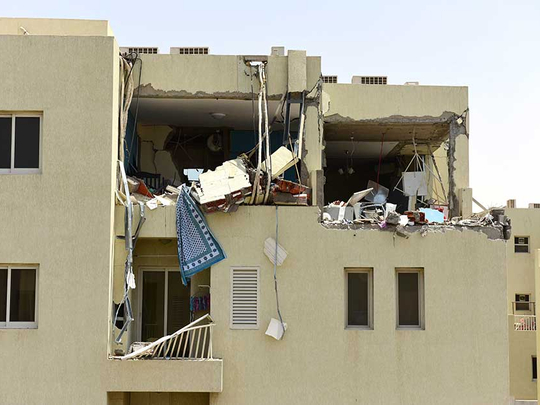
Dubai: The explosion that ripped through an apartment in Al Khail Gate community building last month was caused by a gas build up due to an open stove valve.
The explosion, which took place on August 24 around 11.20am, critically injured two women, while a baby sustained minor injuries.
The women were identified as Shirin Gandhi, 60, and Mariam Gandhi, 35, according to hospital sources.
Shirin succumbed to injuries, while Mariam remains in a critical condition in the hospital.
Fire expert Mohammad Abu Eita, from the Forensic Engineering Department at Dubai Police’s Forensic Science and Criminology Department, said the results of the investigation confirmed that it was a gas explosion.
“We checked for the source of the leak. We first checked the connection between the gas cylinder’s valve and the rubber tube connecting it to the stove, then the connecting point between the rubber tube and the stove — they were not the source of the leak. We then found that one of the stove’s knobs was turned on, which meant the valve was open. This was the cause of the incident,” he said
When gas leaks, it starts mixing with oxygen in the air. When the ratio of flammable gas — such as that used in cooking gas cylinders — to air reaches what scientists call an “explosive limit”, any minor spark can result in an explosion.
“Turning on a light switch is enough to cause an explosion, when the explosive limit is reached,” he said.
The explosive limit differs depending on the flammable gas, Abu Eita explained.
“The gas also increases the pressure in the confined space, such as the apartment in this case, which is why the walls and the roof were blown off,” he said.
In gas explosions, there is usually no fire, just a “flash fire”
A flash fire is a sudden, intense fire caused by ignition of a mixture of air and a dispersed flammable substance. It is characterised by high temperature and short duration.
Abu Eita explained that this is why there were no charred debris. “In flash fires, you will see some melted plastics or singed fabric.”
He said that if the tenants had been in the path of the explosion wave, they would have been thrown out of the building.
As for the intact gas cylinder found at the scene, Abu Eita said that was normal. “A gas cylinder would only explode if there is an external fire that leads to the overheating of the gas inside the cylinder. As long as there is no fire, the cylinder will not explode.”
“The number of gas explosion incidents has gone down over the past five years. We used to have one or two incidents a week, now it’s much less,” he explained.
“With the amount of gas released, they should have smelled it. According to international gas safety codes, (cooking) gas has to have a pungent smell so leaks can be detected. Maybe they were asleep or there was another strong smell masking the scent,” he said.
According to Dubai Civil Defence, the explosion destroyed the walls of the flat and partially damaged two other apartments in the same building as well as an adjacent building.
The blast took place in a fifth-floor apartment of Building No. 39 in Phase 1 of the community in Al Quoz. The impact was such that it shook nearby buildings and glass shards and other debris were blown several metres away.










